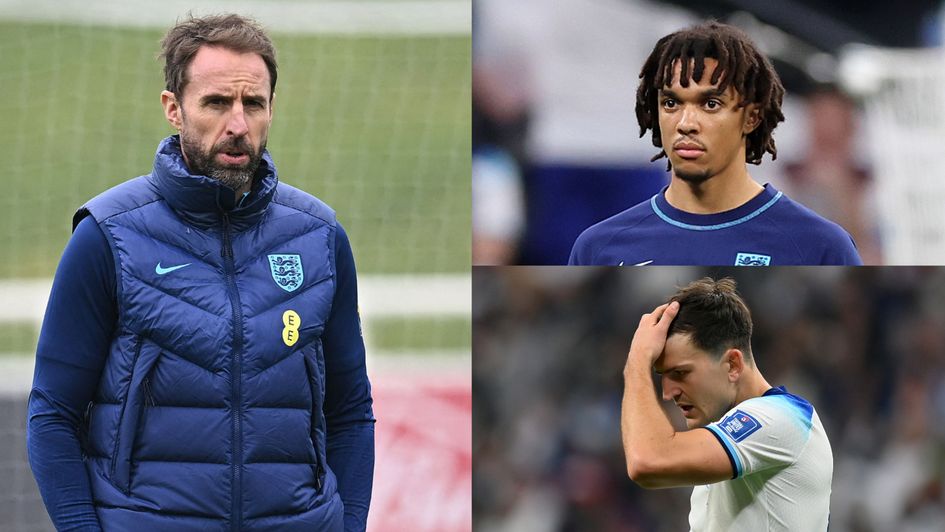The Qatar World Cup already feels unreal somehow, a distant half-memory, and on the eve of the first 2024 European Championship qualifiers it’s as if the competition was just a dream.
- Published before Italy 1-2 England
It doesn’t help that England are in exactly the same place as they were fourth months ago. Did England learn anything from the World Cup? Did anything change or advance? Did it even happen at all?
England travel to Italy on Thursday six months after their last visit: a 1-0 defeat in the Nations League that left Gareth Southgate unsure about his future and left England supporters questioning whether he had taken the nation as far as he could.
The team looked vulnerable in central defence, still lacked control in central midfield, and Southgate’s inability to react in-game was remained his Achilles’ Heel.
Southgate uncertainty not ideal
They will arrive in Naples this week with exactly the same questions hanging over the team, only this time with the dangling uncertainty created by Southgate’s admission that he almost walked away in January.
He asked for time to think about whether he could handle the pressures of the role and although he quickly agreed to continue until after Euro 2024 it is hardly the best atmosphere in which to work. Can England really push on – can they take the next step on the journey – with a manager whose foot is halfway out the door?
The 2-1 defeat to France in the quarter-finals now feels like a natural ending, but only because Southgate came so close to leaving; came so close to giving many England supporters what they want, a fresh pair of eyes and fresh ideas.
But at the time England’s spirited performance looked like it could have been the dawn of a new era, paradoxically precisely because the fallout was a non-event.
The nation could shrug the game off, think themselves unlucky, and move on. That has not happened in decades and is testament to the relaxed and positive environment Southgate has created – and to the excellent standard of football he had England playing.
Because regardless of the old arguments applied retroactively to England’s marginal defeat, their tournament performance was everything England fans could have asked for: confident, progressive, and without the usual inferiority complex.
In fact, so effective was their display against France it is not hyperbole to suggest that had Harry Kane scored his penalty England would have gone on to win the game, comfortably beat Morocco, and outplay an Argentina side nowhere near as good as has been made out.
It is, therefore, fair to say that England do not need major surgery – and indeed are in their healthiest position for decades.
That could all change should England fail to win either of their first two Euro 24 qualifying matches against Italy and Ukraine this week, because with all eight matches in a short span of eight months things could unravel very quickly.
Defensive issues remain
But the chances are, they won’t: what Southgate showed in Qatar, even if the weird mid-winter tournament has been half-erased from memory, is that he has developed England into a nation that can compete with anyone in the world.
There are still flaws, mind. Olivier Giroud’s winner in the quarter-final was soft, the Frenchman rising in between John Stones and a flat-footed Harry Maguire to highlight England’s on-going problem in central defence.
Maguire has been controversially picked again despite barely featuring for Manchester United these days, yet Southgate can hardly be blamed. The bench is not deep, although arguably Luke Shaw could be moved into central defence, where he has performed well this season for Erik ten Hag.
Marc Guehi, Conor Coady, Fikayo Tomori, James Tarkowski, and Tyrone Mings have all regressed this season. There is no natural centre-back to fill in.
Forwards and full-backs solid
At the top end of the pitch things have stabilised nicely thanks to Southgate finally moving beyond Raheem Sterling and Mason Mount for the knockout matches in Qatar, and with Jack Grealish and Marcus Rashford (recently withdrawing from the squad through injury) in top form England are very well stocked here. Phil Foden and Bukayo Saka offer the perfect balance to Harry Kane.
In the full-back positions Southgate has many to choose from although the exclusion of Trent Alexander-Arnold from his squad will once again be used as an emblem of the manager’s instinctive conservatism – a now-out-dated complaint but one that sticks.
Reece James and Kieran Trippier have excelled recently but it is hard to justify the exclusion of Alexander-Arnold, especially given that he has taken to moving infield recently for Liverpool.
Midfield needs a solution
Which brings us onto England’s central midfield. They remain a little brittle here, allowing France to take control in the final 30 minutes despite the notable improvements since Jude Bellingham’s integration into the starting XI, and while it would be foolish to assume Alexander-Arnold should start ahead of Jordan Henderson there is, perhaps, a solution to be found here.
Manchester City and Arsenal in particular (and Liverpool, to a lesser extent) have taken to fielding one full-back in central midfield to gain control of the middle third, and if Southgate was to follow their lead he could place a more advanced eight – Mount or James Maddison – alongside Bellingham and in front of Declan Rice.
Innovation like that is unlikely.
In fact, evolution doesn’t feel like it is high on Southgate’s list of priorities anymore, not based on the latest squad, which failed to include any up-and-coming players like Harvey Elliot, Solly March, Jacob Ramsey, or Morgan Gibbs-White.
This only fuels the argument that Southgate, so close to quitting after the World Cup, sees the next 18 months as his final hurrah.
Forget the tactical side of things, that’s the only reason England supporters should be worried about where the nation is headed.
